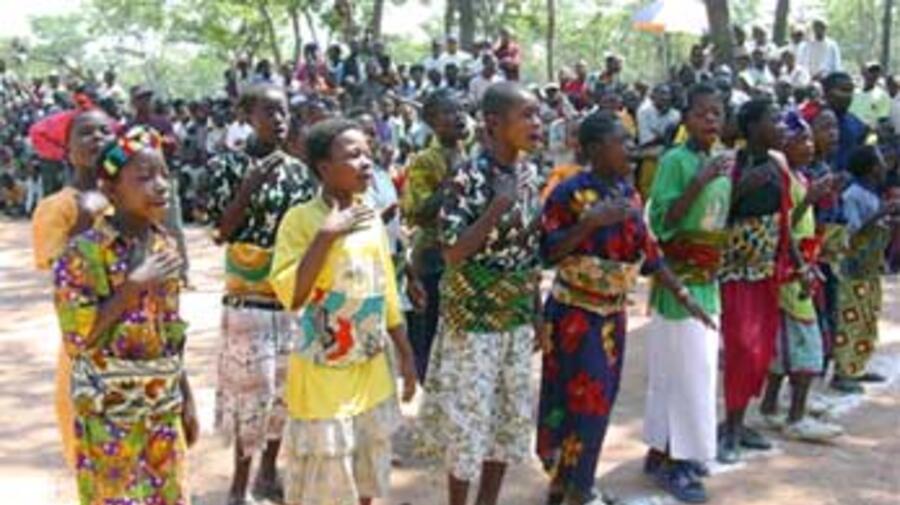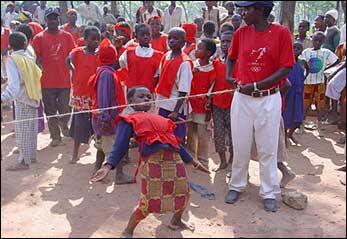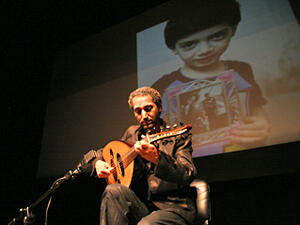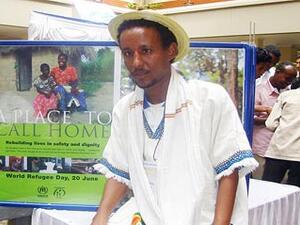Jumpstarting World Refugee Day in Tanzania
Jumpstarting World Refugee Day in Tanzania

Congolese refugees giving a recital during World Refugee Day celeberations at Lugufu camp, Tanzania.
LUGUFU, Tanzania, June 19 (UNHCR) - Congolese refugees in Tanzania's Lugufu camp couldn't wait to celebrate World Refugee Day on Friday, June 20. So they started two days earlier, marking the event with song, dance and play on Wednesday.
When the sound of drums died down at the camp in Kigoma district, the crowd fell silent as two young girls - wrists bound together by rope - stepped into the performance area at Malagarasi Secondary School, the venue for this year's event. With their tied hands held up high, the two Congolese refugees began to recite poems in French.
To loud applause, the girls compared the lives of refugees to that of prisoners, in an apparent reference to newly imposed restrictions that limit the movement of refugees beyond the camp precincts. Refugees clapped loudly when the girls appealed for more food aid to Lugufu, a camp of 91,000 Congolese refugees. Some thumped their feet on the dusty ground while drummers beat their drums made from dried goat skin.
Food rations to refugees in camps in Tanzania were reduced by 50 percent in February this year due to difficulties faced by UN World Food Programme (WFP) in getting food for some countries in Africa. The rations for refugees in Tanzania were increased to 72 percent of normal rations in April this year.
The theme for this year's World Refugee Day is "Refugee Youth: Building the Future". The theme was chosen in a bid to highlight the challenges faced by millions of young refugees. Of the estimated 20 million people cared for by UNHCR today, seven million are youngsters between the ages of 12 and 24.
In Tanzania's Lugufu camp, events to mark World Refugee Day began with a parade of thousands of children from nine primary and secondary schools in Lugufu II - a march which soon turned into a Congolese dance round the large school ground.

Refugee children playing games during the celebrations.
A refugee drama group in the camp underscored the importance of education and the harmful effects of alcoholism, particularly on families. In one skit, performers stressed that education was the key to a better life in exile in Tanzania and also back home, in the Democratic Republic of the Congo, a country many of Lugufu's refugees left in 1997/98. There was a light moment of laughter when the theatre group pointed out that without a good education, one could not marry a westerner.
Kigoma-born Sunday Manara, a famous footballer in Tanzania, participated in the day's events in Lugufu. A leading sports icon, Manara has played for the Tanzanian national soccer team as well as other small football teams in Austria and the Netherlands. He encouraged the refugee youth to strive hard to make something of their lives, and pleaded with African leaders to stop the wars and conflicts that have ravaged the continent.
When the day's events drew to a close, all participants received prizes for their efforts. These included high-protein biscuits donated by WFP, jerry cans from the UN Children's Fund (UNICEF), buckets for water from the European Community Aid Office (ECHO), and T-shirts from UNHCR.






